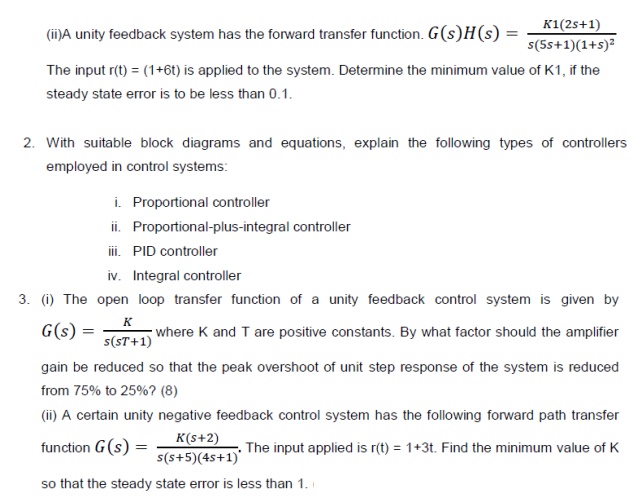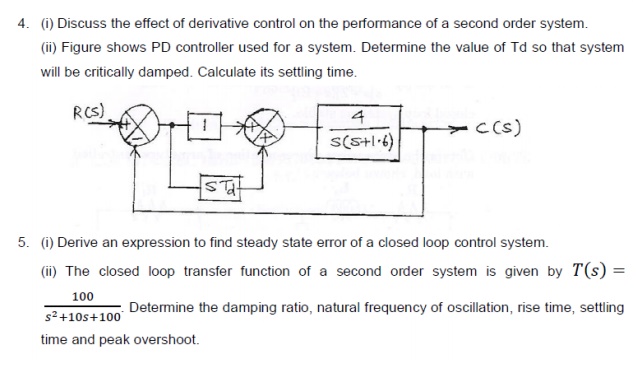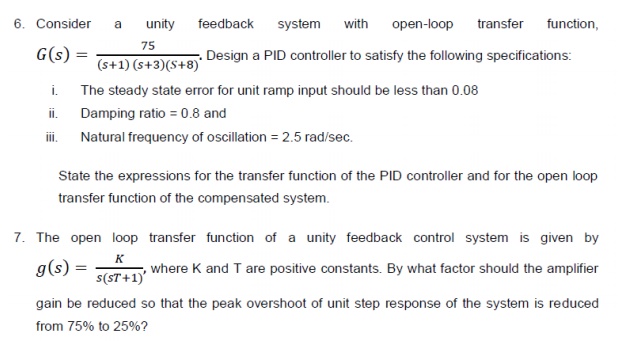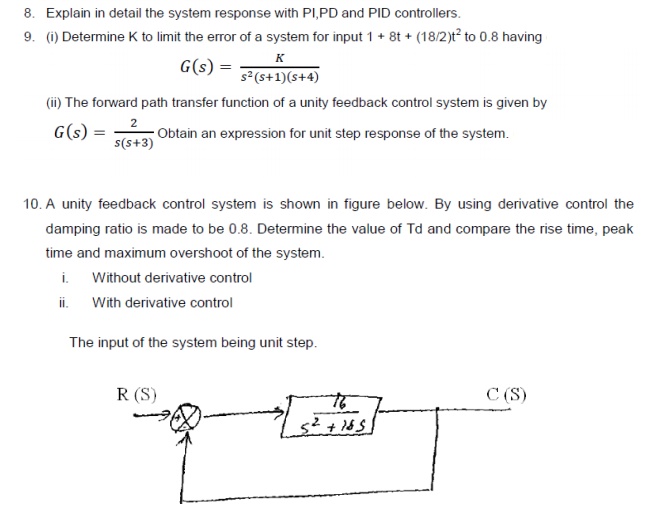Chapter: Control Systems : Time Response Analysis
Important Short Questions, Answers, Tutorial Problems: Time Response Analysis
1.
What is
an order of a system?
The order
of a system is the order of the differential equation governing the system. The
order of the system can be obtained from the transfer function of the given
system.
2.
What is
step signal?
The step
signal is a signal whose value changes from zero to A at t= 0 and remains
constant at A for t>0.
3.
What is
ramp signal?
The ramp
signal is a signal whose value increases linearly with time from an initial
value of zero at t=0.the ramp signal resembles a constant velocity.
4.
What is a
parabolic signal?
The
parabolic signal is a signal whose value varies as a square of time from an
initial value of zero at t=0.This parabolic signal represents constant
acceleration input to the signal.
5.
What is
transient response?
The
transient response is the response of the system when the system changes from
one state to another.
6.
What is
steady state response?
The
steady state response is the response of the system when it approaches
infinity.
7.
Define
Damping ratio.
Damping
ratio is defined as the ratio of actual damping to critical Damping.
8. List the time domain specifications.
The time
domain specifications are
i. Delay
time
ii. Rise time
iii. Peak time
iv.Peak
overshoot
9.
What is
damped frequency of oscillation?
In under
damped system the response is damped oscillatory. The frequency of damped oscillation
is given by ωd = ωn √(1- ζ2)
10. What will be the nature of response of second
order system with different types of damping?
For
undamped system the response is oscillatory.
For under
damped system the response is damped oscillatory.
For critically
damped system the response is exponentially rising.
For over
damped system the response is exponentially rising but the rise time will be
very
large.
11. Define Delay time.
The time
taken for response to reach 50% of final value for the very first time is delay
time.
12. Define Rise time.
The time
taken for response to raise from 0% to 100% for the very first time is rise
time.
13. Define peak time
The time
taken for the response to reach the peak value for the first time is peak time.
14. Define peak overshoot.
Peak
overshoot is defined as the ratio of maximum peak value measured from the
Maximum value to final value
15. Define Settling time.
Settling
time is defined as the time taken by the response to reach and stay within
specified error
16. What is the need for a controller?
The
controller is provided to modify the error signal for better control action.
17. What are the different types of controllers?
The
different types of the controller are
Proportional
controller
PI
controller
PD
controller
PID
controller
18. What is proportional controller?
It is
device that produces a control signal which is proportional to the input error
signal.
19. What is PI controller?
It is
device that produces a control signal consisting of two terms –one proportional
to error signal and the other proportional to the integral of error signal.
20. What is PD controller?
PD
controller is a proportional plus derivative controller which produces an
output signal consisting of two terms -one proportional to error signal and
other proportional to the derivative of the signal.
21. What is the significance of integral controller
and derivative controller in a PID controller?
The
proportional controller stabilizes the gain but produces a steady state error.
The integral control reduces or eliminates the steady state error.
22. Define Steady state error.
The
steady state error is the value of error signal e(t) when t tends to infinity.
23. What is the drawback of static coefficients?
The main
drawback of static coefficient is that it does not show the variation of error
with time and input should be standard input.
24. What are the three constants associated with a
steady state error?
The three
steady state errors constant are
Positional
error constant Kp
Velocity
error constant Kv
Acceleration
error constant Ka
25. What are the main advantages of generalized
error co-efficients?
i) Steady
state is function of time.
ii) Steady
state can be determined from any type of input.
26. What are the effects of adding a zero to a
system?
Adding a
zero to a system results in pronounced early peak to system response thereby
the peak overshoot increases appreciably.
27. Why derivative controller is not used in
control system?
The
derivative controller produces a control action based on rate of change of
error signal and it does not produce corrective measures for any constant
error. Hence derivative controller is not used in control system
28. What is the effect of PI controller on the
system performance?
The PI
controller increases the order of the system by one, which results in reducing
the steady state error .But the system becomes less stable than the original
system.
29. What is the effect of PD controller on system
performance?
The
effect of PD controller is to increase the damping ratio of the system and so
the peak overshoot is reduced.
30. What is the disadvantage in proportional
controller?
The disadvantage in proportional controller is that it produces a constant steady state error.





Related Topics